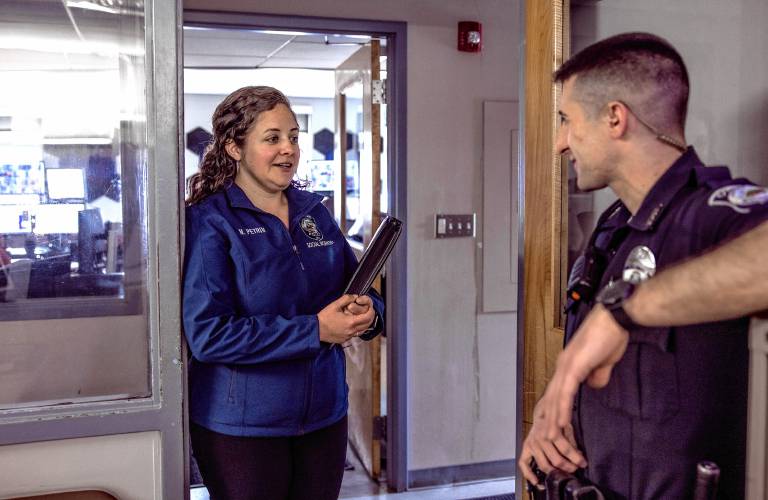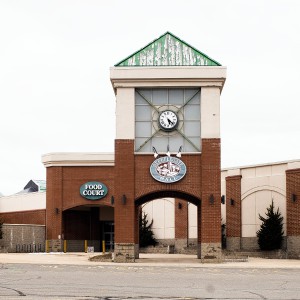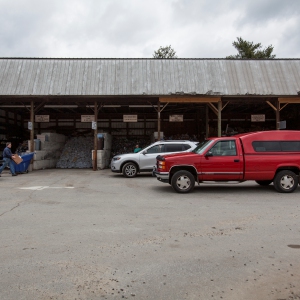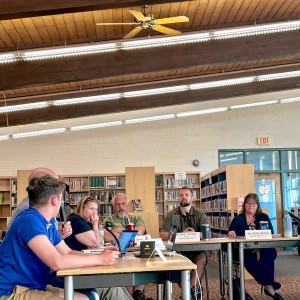Skepticism turns to enthusiasm: Concord Police welcome new social worker

Concord Police Department social worker Nicole Petrin talks with police officer Alex Cronin in the dispatch area on Friday. GEOFF FORESTER / Monitor staff
| Published: 04-27-2024 4:58 PM |
One of Nicole Petrin’s first cases in her new role as the Concord Police Department’s social worker drew frequent calls demanding officers’ attention.
A senior woman with disabilities would often be wandering downtown. Chronically food insecure, she had been looking for something to eat.
When this had happened dozens of times before, officers would typically get her home safely and then get called to go somewhere else. Out of concern, they’d sometimes try and get her a meal — one officer once cooked her eggs.
After Petrin got involved, she connected the woman with regular food delivery and senior care services. Concord Police have not been called to help her since.
“Now there’s this joke that ‘Nicole can do anything,’” Petrin said. “Officers had been trying to find a solution to that for two years, and what they’d been trying to do for two years, I did in two days.”
Concord Police hired Petrin as its first-ever social worker this year after City Council approved Chief Bradley Osgood’s request to add the position to the police payroll during budget deliberations last spring.
Support organizations in Concord said they have been thrilled with the position so far and emphasized that it is already connecting people in need with the right services sooner. Despite some initial wariness, police officers have embraced the position, and Deputy Chief John Thomas pointed to its immediate impact on repeat calls for service as a sign of its early success. Concord already has ambitions to expand its social work department by adding a second full-time position and, eventually, take on interns.
“This is a chance for us to extend our arms further out into the community, where officers want to give support but we don’t know how,” Thomas said.
Article continues after...
Yesterday's Most Read Articles
 Neighboring landowner objection stalls Steeplegate redevelopment approval
Neighboring landowner objection stalls Steeplegate redevelopment approval
 Northeast Coffee Festival comes to Concord this weekend
Northeast Coffee Festival comes to Concord this weekend
 Hopkinton tries to nab out-of-town trash bandits
Hopkinton tries to nab out-of-town trash bandits
 On the Trail: Democrat Maggie Goodlander jumps into race to succeed Kuster
On the Trail: Democrat Maggie Goodlander jumps into race to succeed Kuster
 NH Senate panel frowns on bill to ease vehicle inspection requirements
NH Senate panel frowns on bill to ease vehicle inspection requirements
 Steeplegate project to reopen to public comment as developer seeks to reduce required parking
Steeplegate project to reopen to public comment as developer seeks to reduce required parking
Petrin, who said she comes from a family full of first responders, has more than 10 years’ experience in child protection with the state’s Division for Children, Youth and Families on her resume along with time spent as a family support specialist with Merrimack County. That history means she already had worked with, and in some cases worked for, many of the region’s social service organizations. When reached for this story, several of those agencies emphasized how pleased they were that Petrin had gotten the job.
“I was so, so happy to hear, one, that the position was happening and, two, that they hired Nicole,” said Sarah Gagnon, vice president of of clinical operations at Riverbend Community Mental Health, where Petrin was once an intern. “Knowing that she has that educational background, that she knows Riverbend’s services and she knows the Concord community, we were delighted to hear that she got the position.”
The capital city is one of only a handful in the state to have an on-staff social worker. Dover led the trend, adding a grant-funded social worker to its police force two years ago. Keene and Portsmouth have followed suit, hiring their own social workers in the last month. Concord, like its peers, follows a “non-co-response” model, meaning Petrin does not accompany officers responding to any call, whether for a mental health crisis or a welfare check.
Non-co-response means Petrin adds onto, rather than replaces, the work of patrol officers, Concord Police emphasized. There are no calls for service to police where a social worker now shows up instead.
Concord opted for this approach because a social worker responding alongside police puts more safety burden on officers — it’s one more civilian at a scene they have to protect, Thomas said.
Because of the existence of emergency resources like the Community Crisis Centers of New Hampshire and the 988 crisis lifeline, Concord had a greater gap in care after police interventions than during them, Petrin said.
For example, Petrin described, when officers assist with an involuntary admission to the emergency room, their responsibility is to ensure the person gets there safely. Her role, by comparison, is to share what police know about this person’s history, to support their family, and to ensure there’s a referral to the right support resources.
“It’s really that follow-up after the police go out there,” Petrin said. “Finding out what more can be done to really cut back on those calls for the same situations or to offer support to individuals when it’s non-criminal in nature but something else needs to happen besides just an officer stopping by.”
Among those who would be referred to Petrin — either by her own daily combing of dispatch logs or by officers flagging situations to her directly — are survivors of domestic abuse, people subject to welfare checks and families who recently experienced an untimely death or had someone involuntarily admitted to a hospital for mental health reasons.
Support organizations in mental healthcare, crisis intervention and county services said that having a social worker in Concord Police builds a crucial bridge between their programs and what police officers learn on the ground. From the county’s Adverse Childhood Experiences Response Team (ACERT) — which tries to find and assist kids that have experienced or witnessed abuse, neglect, criminality or other traumas — to Riverbend’s crisis diversion role in the state, Petrin can identify people who could benefit from these programs and might not otherwise get connected with them.
While there always has been collaboration between Concord Police and Riverbend to close the gaps in mental healthcare that lead to police action,“there was never a position in the police department to dedicate their whole day to that,” Gagnon said.
Connor Spern, outreach and data engagement specialist at the Concord Coalition to End Homelessness, said she and Petrin talk almost daily.
Petrin’s role as a liaison is especially helpful to the coalition, Spern and Executive Director Karen Jantzen said, in helping to highlight those in the community whose situation is escalating. If someone has had police encounters, the coalition can now be informed about it “in real time” instead of relying on word of mouth and its own outreach.
“We find out about things after the fact, and we’re constantly responding and putting out the fire,” Spern said. Now, Petrin “can identify the smolder for us, and then we can potentially put a blanket on it and keep that person safe, keep that person more stable.”
Petrin also has the connections and even some leverage, Spern said, to help anyone she works with, including those experiencing homelessness, get the help they need sooner.
“When she makes a referral somewhere and says, ‘I’m with the Concord Police Department’ that tends to get movement a little faster than a client just individually reaching out,” Spern said.
Within the police department, a social worker can also help to reduce officer workload by preventing future or repeat calls in non-criminal situations, like with the woman in need of food.
“A lot of the social issues that officers have to respond to really aren’t things that the officers should be dealing with,” Thomas said. “Nowadays police wear so many different hats: they’re a counselor, they’re a social worker, and they’re expected to still enforce the law. So now that’s one less hat they have to carry.”
Officers expressed initial skepticism of the role, Thomas said. As a proposal that grew in popularity during national social movements following the 2020 death of George Floyd, he said many officers worried that a department social worker posed a threat to patrol resources.
“This is just another tool to support patrol in the long run,” Thomas said. And once officers saw how the position could reduce chronic calls and address their underlying causes, “They were sold. They’re her biggest fans.”
Officers in Dover had a similar wariness when their department became the first in the state to add a social worker two years ago, Chief William Breault said. But they warmed to it as they saw how the position could resolve situations where they had spent a lot of time — one woman helped by the social worker had interacted with officers 60 times in the preceding five-week span, totaling more than 30 hours of police work, according to Breault — and provide care to people they had struggled to help.
Dover got a federal Department of Justice grant to hire a social worker starting in 2022 and has since added a second who focuses solely on outreach into the homeless community.
He called the effort a major success — like Thomas, he pointed to how many repeat call situations had been resolved after they were taken on by a social worker.
“It certainly isn’t a soft-on-crime approach — it actually frustrates me when people think that’s what we’re doing,” Breault said. “It’s actually the opposite. We’re freeing up officers from dealing with non-criminal issues so they can deal with criminal issues.”
Eventually, the grant funding for those positions will run out. Breault said he’s confident that, when that time comes, the department will be able to show Dover’s city government that the positions are worth taxpayer dollars, though he acknowledged that evaluating the effectiveness of the position so far has been more qualitative, even anecdotal, than data-based.
Measuring success “is honestly something we’re still working through,” Breault said. “Is it the number of times we offer assistance to somebody? Is it the number of times people accept assistance? Is it call-based? And then if you’re doing your job and you’re preventing things, how do you know what you’ve prevented?”
Thomas similarly said that Concord does not have firm data parameters it will use to monitor the social worker program in the long run. But support organization leaders pointed to where they expect to find — and are already seeing — signs that the program is effective: preventing criminality and increasing the number of people using their resources.
“I would personally call it a success if we find that we’re being able to reach more people who wouldn’t necessarily call us just from the PD having a visit, that we’re able to reach more people and provide services to more people,” said Debbie Johnson, development and communications director at the Crisis Center Of Central New Hampshire.
Jantzen said she is hoping to see “a reduction in unnecessary incarcerations,” where improved intervention and fewer escalating interactions with Concord police disrupt a “revolving door cycle” of arrests of people who have become a safety threat to themselves or others.
If Concord Police, through both Petrin and officers, can be a better link to solutions for people experiencing homelessness, Spern said, it could not only help prevent escalating problems but also change the mindset within homeless communities about the presence of law enforcement, demonstrating to people that there are outcomes to police involvement other than getting arrested.
“I’ve had a couple of instances where people are like, ‘Really Connor? Somebody from the police department?’’” Spern said. “I’m like, ‘guys, I would never bring anyone to you that I don’t trust.’”
“As unfortunate as it might be for our clients to constantly be getting arrested, that’s the system right now,” she continued. “If it’s something where they have built a positive relationship with someone from the police department, it might make it easier for police to engage.”
Like Dover, Concord plans to add a second social worker position and later start an internship program.
Seeing the full capabilities of the social worker program will take time, Thomas said, but even in the first few months there have been some “huge wins.”
“If we had five of her, you know, we’d be in great shape.”


 Adam Montgomery sentenced to minimum 56 years on murder charges in young daughter’s death
Adam Montgomery sentenced to minimum 56 years on murder charges in young daughter’s death Following budget cut, Pembroke revisits future of elementary school re-build
Following budget cut, Pembroke revisits future of elementary school re-build Granite Geek: Free government software for taxes – what could go wrong? (Not much, as it turns out)
Granite Geek: Free government software for taxes – what could go wrong? (Not much, as it turns out)
